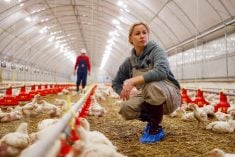BEIJING (Reuters) — China, the world’s top producer of rice and wheat, is targeting zero growth in the use of chemical fertilizers and pesticides by 2020 to avoid further contamination of its farmland, the official Xinhua news agency reported on Tuesday.
Wide use of chemical fertilizers, of which China is the biggest consumer, has boosted its agricultural output and kept the world’s most populous country largely self-sufficient in grains, but it has also threatened food safety.
“Overuse of chemical fertilizer has increased costs and damaged the agriculture ecological environment,” Zeng Yande, a department director with the agriculture ministry, was quoted as saying at the launch of a chemical reduction plan.
Read Also

B.C. ostriches culled, CFIA confirms
Ostriches on an embattled Edgewood, B.C. farm have been culled after a prolonged legal battle, the Canadian Food Inspection Agency has confirmed.
China accounts for a little over a fifth of the world’s total grain output, while its use of chemical fertilizer is more than a third of global consumption and equivalent to the total use by the United States and India combined, said Xinhua.
Annual growth in the use of chemical fertilizers will be capped below one percent from 2015-19, it said, with no growth slated for 2020.
China’s use of chemical fertilizer grew by an average 5.2 percent a year over the past three decades, reaching 59 million tonnes in 2013, Xinhua said. Its use versus output is 2.6 times that of the United States and 2.5 times that of the European Union, it said.
Overuse of fertilizer is the main reason for soil acidification in China, Zhang Fusuo, a professor at the China Agricultural University, was cited as saying.
China will use more organic fertilizer, currently not fully utilized, to help boost grain output, said Zeng, who did not expect the switch to threaten the country’s food security.














